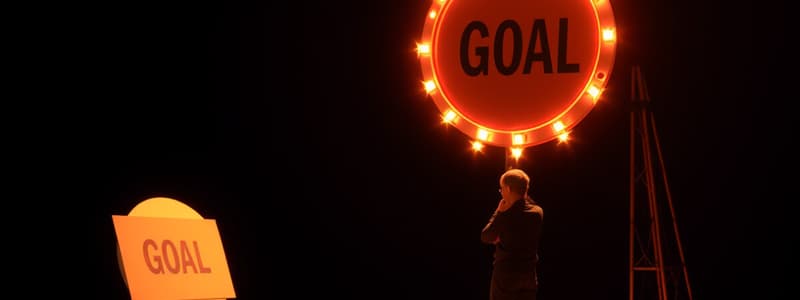Podcast
Questions and Answers
What is Constructive Alternativism?
What is Constructive Alternativism?
It is alternative scientific constructs that each provide a useful view of the world.
What are Cognitive Processes?
What are Cognitive Processes?
They are mental procedures that categorize people and things and attribute personal meanings to events.
What contributions did George Kelly make about the Cognitive Perspective within Personality Psychology?
What contributions did George Kelly make about the Cognitive Perspective within Personality Psychology?
He laid a basis for social cognition and emphasized that meaning depends on the individual's perspective.
What is 'invitational mood'?
What is 'invitational mood'?
What was Kelly's Theory: Psychology of Personal Constructs, in 1955?
What was Kelly's Theory: Psychology of Personal Constructs, in 1955?
What is Fixed Role Therapy?
What is Fixed Role Therapy?
What were the positives of Kelly's Construct Theory?
What were the positives of Kelly's Construct Theory?
What were the negatives of Kelly's Construct Theory?
What were the negatives of Kelly's Construct Theory?
What is a construct?
What is a construct?
What is required when forming a construct?
What is required when forming a construct?
What is Psychopathology?
What is Psychopathology?
What is the REP Test?
What is the REP Test?
What is cognitive complexity?
What is cognitive complexity?
Who is a Highly-Complex person (Bieri)?
Who is a Highly-Complex person (Bieri)?
Who is a Low-Complex person (Bieri)?
Who is a Low-Complex person (Bieri)?
Who is a Cognitive Complex Student (Bieri)?
Who is a Cognitive Complex Student (Bieri)?
What is the Construct System Hierarchy?
What is the Construct System Hierarchy?
What are the types of constructs?
What are the types of constructs?
How are we like scientists?
How are we like scientists?
How do constructs develop over time?
How do constructs develop over time?
All constructs have what?
All constructs have what?
What was Linville's theory for cognitive psychology?
What was Linville's theory for cognitive psychology?
What happens if the construct is valid?
What happens if the construct is valid?
What happens if the construct is invalid?
What happens if the construct is invalid?
What causes anxiety?
What causes anxiety?
What causes fear?
What causes fear?
What causes a threat?
What causes a threat?
What dynamics within constructs create tension?
What dynamics within constructs create tension?
What is the Social Cognitive Theory?
What is the Social Cognitive Theory?
Who was Albert Bandura?
Who was Albert Bandura?
What was the Social Learning & Personality Study, in 1959?
What was the Social Learning & Personality Study, in 1959?
What is the Social Foundations of Thought and Action, in 1986?
What is the Social Foundations of Thought and Action, in 1986?
What is Reciprocal Determinism?
What is Reciprocal Determinism?
Who was Walter Mischel?
Who was Walter Mischel?
What was the study Personality and Assessment, in 1968?
What was the study Personality and Assessment, in 1968?
What structures our personality?
What structures our personality?
What are Competencies and Skills?
What are Competencies and Skills?
What are Beliefs and Expectancies?
What are Beliefs and Expectancies?
What are perceived self-efficacy beliefs?
What are perceived self-efficacy beliefs?
What is the contrast between Outcome Expectations and Self-Efficacy Expectations?
What is the contrast between Outcome Expectations and Self-Efficacy Expectations?
What is the relationship between Self-Efficacy and anxiety?
What is the relationship between Self-Efficacy and anxiety?
What is the relationship between Self-Efficacy and depression?
What is the relationship between Self-Efficacy and depression?
What is the relationship between low self-efficacy and performance?
What is the relationship between low self-efficacy and performance?
What was the Bobo Doll Experiment?
What was the Bobo Doll Experiment?
What is vicarious conditioning?
What is vicarious conditioning?
What is stress?
What is stress?
How is stress and coping related?
How is stress and coping related?
What is Stress Inoculation?
What is Stress Inoculation?
What did Lazarus and Folkman contribute to social cognitive psychology?
What did Lazarus and Folkman contribute to social cognitive psychology?
How is coping related to personality factors?
How is coping related to personality factors?
What was Mischel's Paradigm: The Marshmallow Test?
What was Mischel's Paradigm: The Marshmallow Test?
How does Bandura define and study 'modeling'?
How does Bandura define and study 'modeling'?
What is observational learning?
What is observational learning?
What is self-regulation?
What is self-regulation?
What is the greatest cause for motivation?
What is the greatest cause for motivation?
What are the positive aspects of the Social Cognitive Theory?
What are the positive aspects of the Social Cognitive Theory?
What are the negative aspects of the Social Cognitive Theory?
What are the negative aspects of the Social Cognitive Theory?
What is the 'Rational Emotive Therapy'?
What is the 'Rational Emotive Therapy'?
What is the 'ABC' of Rational Emotive Therapy?
What is the 'ABC' of Rational Emotive Therapy?
What are psychological difficulties due to (Arron Beck's standpoint)?
What are psychological difficulties due to (Arron Beck's standpoint)?
What is Beck's Cognitive Triad of Depression?
What is Beck's Cognitive Triad of Depression?
What is Beck's Cognitive Therapy for Depression?
What is Beck's Cognitive Therapy for Depression?
What are Highly Specific Learning Environments?
What are Highly Specific Learning Environments?
What are 'Faulty Cognitions'?
What are 'Faulty Cognitions'?
How does Bandura theorize a way to change self-efficacy within an individual?
How does Bandura theorize a way to change self-efficacy within an individual?
What is Higgin's Theory for Social Cognition Psychology?
What is Higgin's Theory for Social Cognition Psychology?
What is the Cognitive Affective Processing System?
What is the Cognitive Affective Processing System?
What are evaluative standards?
What are evaluative standards?
What are the schemas within Social Cognition?
What are the schemas within Social Cognition?
How are Self-Schemas validated?
How are Self-Schemas validated?
What are Self-enhancement motives?
What are Self-enhancement motives?
What are Self-verification motives?
What are Self-verification motives?
How are goals ordered?
How are goals ordered?
How do goals correlate with motivation?
How do goals correlate with motivation?
Flashcards are hidden until you start studying
Study Notes
Social Cognitive Theory
- Describes how individuals learn behaviors by observing models and their consequences, impacting their own behavior.
- Integrates cognitive processes with social environments, considering past experiences and future possibilities.
Albert Bandura
- Psychologist who advanced the social learning concept, focusing on social modeling in motivation and behavior.
Social Learning & Personality Study (1959)
- Conducted by Bandura and Walters, examining adolescent aggression alongside child-rearing practices.
Social Foundations of Thought and Action (1986)
- Bandura's influential book detailing human motivation through a social cognitive lens, emphasizing cognitive and self-regulatory processes.
Reciprocal Determinism
- Bandura's principle asserting that behavior, personal factors, and the social environment mutually influence one another.
Walter Mischel
- Psychologist known for contributions to personality theory, focusing on situational influences on behavior.
Personality and Assessment (1968)
- Mischel's study highlighting the situational context's role in behavior, coining the term "personality signatures."
Components Structuring Personality
- Competencies and skills: How individuals adapt and confront challenges.
- Beliefs and expectations: Personal perceptions of reality and future aspirations.
- Evaluative standards: Personal benchmarks guiding motivation and performance.
Competencies and Skills
- Involve how individuals approach problems and apply different behavioral skills, influenced by knowledge and situational contexts.
Beliefs and Expectancies
- Shape perceptions of reality and future goals, leading to unique patterns of behavior and emotional responses.
Self-Efficacy Beliefs
- Perceptions of personal capabilities in various situations, influencing motivation, effort, mood, and coping strategies.
Outcome vs. Self-Efficacy Expectations
- Outcome expectations: Focus on potential rewards/punishments.
- Self-efficacy expectations: Emphasize one's capabilities to act, rather than just predicting outcomes.
Self-Efficacy, Anxiety, and Depression
- Low self-efficacy correlates with higher anxiety and depression, stemming from distorted self-perceptions and unattainable goals.
Bobo Doll Experiment (1963)
- Bandura's study demonstrating observational learning; children imitated aggressive behavior based on observed consequences.
Vicarious Conditioning
- Learning emotional responses through others' experiences rather than direct encounters.
Stress
- Defined as perceived circumstances exceeding resources or threatening well-being, influenced by personality traits.
Coping Strategies
- Problem-focused coping: Actively addressing the stressor.
- Emotion-focused coping: Managing emotional responses to the situation.
Stress Inoculation
- Intervention aimed at enhancing coping mechanisms through problem-solving, relaxation, and cognitive restructuring.
Lazarus and Folkman's Contributions
- Emphasized stress response assessments through primary (initial threat perception) and secondary appraisals (coping strategies).
Coping and Personality Factors
- Coping methods influenced by personality traits, with maladaptive coping resulting from heightened stress levels.
Mischel's Marshmallow Test
- Study on delayed gratification revealing how distraction aids self-control in children.
Bandura's Concept of "Modeling"
- Describes the process where observing rewarded behaviors encourages imitation of those actions.
Observational Learning
- Development of internal representations based on external stimuli, comprising acquisition and performance relationships.
Self-Regulation
- Ability to self-motivate and manage emotions through goal-setting and behavioral modification.
Motivation Factors
- Driven by the combination of set goals and feedback, enhancing effort in performance.
Social Cognitive Theory: Positives and Negatives
- Positives: Strong empirical support, clear applicability in therapy, comprehensive measures of social cognition.
- Negatives: Lack of systematic integration and overgeneralization of terms.
Rational Emotive Therapy
- Developed by Albert Ellis, focusing on rational beliefs to counter emotional disturbances; identified through the ABC model.
Beck's Cognitive Triad of Depression
- Highlights negative perceptions of self, world, and future as key elements contributing to depression.
Faulty Cognitions
- Negative automatic thoughts leading to distorted self-views and increased pessimism.
Self-Schemas
- Beliefs about oneself that influence social interactions and self-perception through quick validation measures.
Self-Enhancement vs. Self-Verification Motives
- Self-enhancement: Bias towards positive self-perception.
- Self-verification: Seeking confirmation of self-views from others.
Goals and Motivation
- Hierarchical organization of goals impacts focus and motivation, distinguishing between learning and performance objectives.
Constructive Alternativism
- Recognition of multiple perspectives in understanding reality, encouraging diverse interpretations.
Cognitive Processes
- Automatic categorization and meaning attribution, shaping individual behavior and identity.
George Kelly's Contributions
- Introduced the idea that personal constructs guide personality development through cognitive predictions and interpretations.
Invitational Mood
- Concept suggesting the absence of a single truth, promoting various explanatory perspectives for personal experiences.### Fixed Role Therapy
- Treatment involves both client and therapist establishing an understanding of the client.
- Therapist creates an alternate persona for the client to embody, aimed at expanding their construct system.
- Client evaluates the "established person" and decides whether to adopt this new personality for two weeks.
- The objective is to reconstruct self-identity for better predictive capabilities.
- Aims to refine the construct system, leading to the release of old ideas and creation of new ones.
Positives of Kelly's Construct Theory
- Strong data foundation with systematic presentation.
- High levels of testability due to precise definitions and objective measures.
- Offers solid comprehension if foundational concepts are accepted.
- Practical application bolstered by Kelly's clinical experience.
Negatives of Kelly's Construct Theory
- Limited database with a lack of subject diversity and technological constraints.
- Weak testability due to the inability to assess core concepts.
- Comprehension difficulties arise for those who do not endorse the theory's fundamentals.
Personal Constructs
- Constructs represent an individual’s understanding of the world and are foundational to personality.
- Personal constructs are unique cognitive categories used to interpret experiences.
- They facilitate predictions based on distinguishing characteristics observed in experiences.
- Construct formation is automatic, created from acquired knowledge, and relies on identifying patterns.
Construct Formation Requirements
- Requires at least three elements: two similar (similarity pole) and one dissimilar (contrast pole).
Psychopathology
- Refers to the avoidance of anxiety and perceived threats.
- Individuals utilize protective mechanisms (e.g., repression) to exclude conflicting elements from their constructs.
REP Test
- Repertory Test assesses how clients perceive their world through their construct system.
- Clients create a list of known individuals, selecting three to compare for similarities and differences.
Cognitive Complexity
- Indicates a rich construct system with numerous non-overlapping constructs.
- Higher complexity correlates with cognitive expertise and an enhanced ability to differentiate between stimuli.
Highly-Complex Person
- Engages inconsistent information to form impressions and comprehends diverse roles.
- Distinguishes subtle nuances in interactions.
Low-Complex Person
- Exhibits rigid thinking, basing impressions solely on consistent information.
Cognitive Complex Student
- More accurate in predicting others' behaviors and recognizing personal differences.
- Demonstrates greater empathy by understanding perspectives beyond their own.
Construct System Hierarchy
- Superordinate: The most general level of constructs (e.g., Candy).
- Middle Level: More detailed yet still broad (e.g., Chocolate).
- Subordinate: Specific constructs (e.g., M&Ms).
Types of Constructs
- Verbal: Expressed through language.
- Preverbal: Formed before language acquisition.
- Submerged: Outside current awareness but previously recognized.
- Core: Fundamental constructs that affect the entire person upon change.
- Peripheral: Less critical constructs that can change without broader impact.
Comparison to Scientists
- Humans develop theories, test hypotheses, and adapt based on evidence, akin to scientific methods.
Development of Constructs
- Complexity increases with growth, leading to qualitative changes and enhanced empathy towards others' construct systems.
Constructs' Utility
- Range of convenience identifies applicable events for constructs.
- Focus of convenience specifies the most useful event for a construct's application.
Linville's Theory of Cognitive Psychology
- Proposed that higher complexity diminishes stress impacts, offering various life roles as distractions and buffers against malaise.
Valid Constructs
- Valid constructs allow for consistent predictions and support the maintenance of core principles.
Invalid Constructs
- Require the development of new or the expansion of existing constructs to incorporate new experiences.
Causes of Anxiety
- Arises from confrontation with events that lie outside one’s construct system, leading to inability to identify them.
Causes of Fear
- Triggered by exposure to new constructs for the first time.
Causes of Threat
- Awareness of impending major changes to core constructs generates feelings of threat.
Dynamics Creating Tension in Constructs
- Tension stems from the conflict between the urge to expand constructs and the desire to maintain comfort within existing frameworks.
Studying That Suits You
Use AI to generate personalized quizzes and flashcards to suit your learning preferences.




